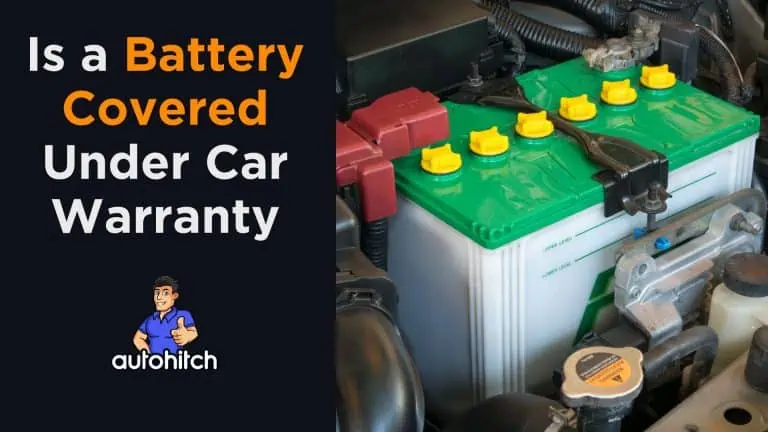Most new car warranties cover the battery for a limited period, typically 3 years or 36,000 miles. However, batteries are generally not covered by extended car warranties because they are considered “wear and tear” items, similar to tires and brake pads.
That being said, extended car warranty companies do have options to add battery coverage for an extra fee.
New Car Battery Warranty Coverage
When you purchase a new vehicle, the battery is covered under the manufacturer’s bumper-to-bumper warranty for a set period:
| Manufacturer | Battery Warranty |
|---|---|
| Ford | 3 years/36,000 miles |
| Toyota | 3 years/36,000 miles |
| Honda | 3 years/36,000 miles |
| Hyundai | 3 years/36,000 miles |
| Chevrolet | 3 years/36,000 miles |
During this period, if the original battery fails due to a defect, the manufacturer will replace it at no cost. However, the warranty does not cover battery failure due to normal wear and tear or improper maintenance.
Related Articles:
Extended Warranty Battery Coverage
Extended warranties, also known as vehicle service contracts, are offered by third-party providers and can be purchased separately. Coverage for the battery varies among providers:
- Some extended warranties, like those from Endurance and CarShield, exclude batteries as they are considered wear items.
- Other providers, such as Autopom! and Olive, offer plans that cover the battery replacement cost if it fails due to a defect.
When purchasing an extended warranty, carefully review the contract to understand if the battery is covered and under what conditions.
Car Battery Warranty from Manufacturers
In addition to the coverage provided by the new car warranty, battery manufacturers also offer their own warranties on replacement batteries:
- Most lead-acid batteries come with a free replacement period (typically 1-3 years) and a prorated period (3-5 years).
- Premium AGM and lithium-ion batteries may have longer warranties, ranging from 3-8 years or more.
To take advantage of the battery manufacturer’s warranty, you must keep the purchase receipt and follow the proper maintenance guidelines.
Car Battery Warranties for Electric Vehicles
Electric vehicle (EV) batteries are covered by manufacturer warranties that provide protection against defects and excessive capacity loss. Here are some key points about EV battery warranties:
- Federal law requires automakers to provide at least an 8-year/100,000-mile warranty on EV batteries. This covers complete battery failure or malfunction.
- Many automakers go beyond the federal minimum, offering longer warranties or covering battery capacity degradation below a certain threshold (typically 60-70% of original capacity).
- Tesla offers an 8-year/100,000-mile to 8-year/150,000-mile battery warranty depending on the model, covering capacity retention down to 70%.
- Nissan provides an 8-year/100,000-mile defect warranty on the Leaf battery, covering capacity down to 9 bars out of 12 initially.
- BMW offers an 8-year/100,000-mile high-voltage battery warranty on the i3, covering capacity loss beyond 70%.
- Hyundai and Kia provide a 10-year/100,000-mile battery warranty on EVs like the Kona Electric and EV6.
- The battery warranty is transferable to subsequent owners if the vehicle is sold during the warranty period.
There are some exclusions that can void the battery warranty, such as:
- Physical damage or opening the battery pack
- Using incompatible charging equipment
- Failure to follow proper charging/operating procedures
- Unauthorized repairs by non-certified technicians
Extended Warranties For EV Batteries
Third-Party Extended Warranty Facts:
- Some third-party extended warranty providers offer specific coverage for EV/hybrid batteries after the manufacturer warranty expires.
- Companies like Endurance, CarShield, and Xcelerate offer plans that can cover battery replacement costs up to a certain limit (e.g. $25,000).
- Coverage terms and battery degradation thresholds vary by provider and plan.
Summary Conclusion
Car Batteries: While new car warranties generally cover the battery for the first few years, extended warranty coverage varies because although the basic policies don’t cover batteries, there are options to add a car battery under the policy for an added fee.
EVs (Electric Cars): all new EVs come with at least 8 years of battery warranty coverage mandated by federal law, but many automakers provide more comprehensive protection against capacity loss over a longer period.
Sources
- https://www.calilemonlawyers.com/car-battery-warranty/
- https://carshield.com/education-center/2023/08/what-does-an-extended-warranty-cover
- https://www.capitalone.com/cars/learn/finding-the-right-car/5-things-to-look-for-in-a-car-battery-warranty/2467
- https://www.reddit.com/r/electricvehicles/comments/v7y24x/does_it_make_sense_to_buy_an_extended_warranty_on/?rdt=54303
- https://www.greencars.com/greencars-101/ev-battery-warranties-and-exclusions



